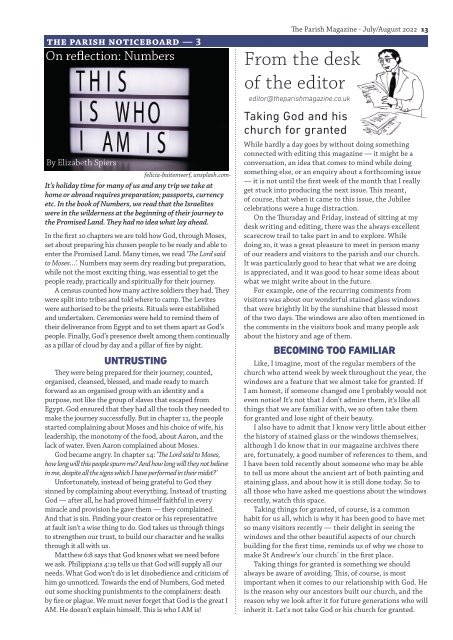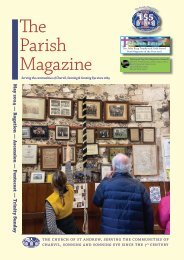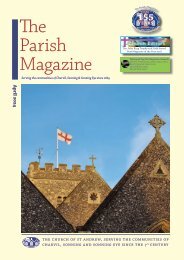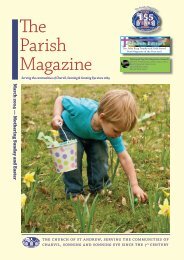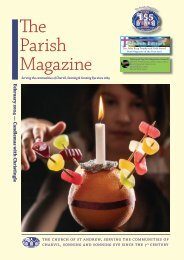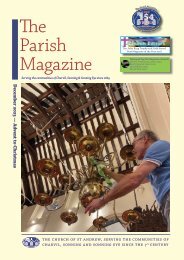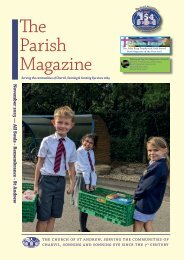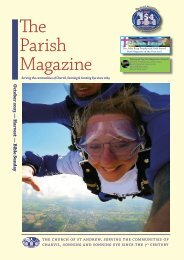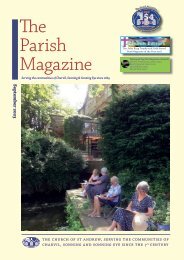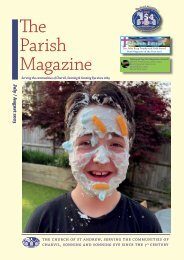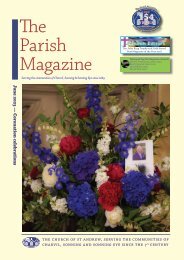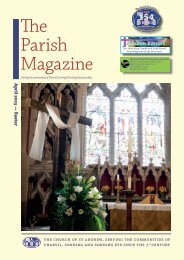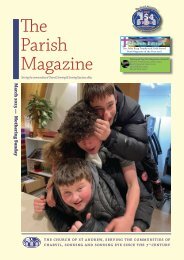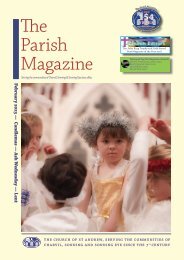The Parish Magazine July August 2022
Serving the communities of Charvil, Sonning and Sonning Eye since 1869
Serving the communities of Charvil, Sonning and Sonning Eye since 1869
Create successful ePaper yourself
Turn your PDF publications into a flip-book with our unique Google optimized e-Paper software.
the parish noticeboard — 3<br />
On reflection: Numbers<br />
By Elizabeth Spiers<br />
felicia-buitenwerf, unsplash.com-<br />
It’s holiday time for many of us and any trip we take at<br />
home or abroad requires preparation; passports, currency<br />
etc. In the book of Numbers, we read that the Israelites<br />
were in the wilderness at the beginning of their journey to<br />
the Promised Land. <strong>The</strong>y had no idea what lay ahead.<br />
In the first 10 chapters we are told how God, through Moses,<br />
set about preparing his chosen people to be ready and able to<br />
enter the Promised Land. Many times, we read ‘<strong>The</strong> Lord said<br />
to Moses…’. Numbers may seem dry reading but preparation,<br />
while not the most exciting thing, was essential to get the<br />
people ready, practically and spiritually for their journey.<br />
A census counted how many active soldiers they had. <strong>The</strong>y<br />
were split into tribes and told where to camp. <strong>The</strong> Levites<br />
were authorised to be the priests. Rituals were established<br />
and undertaken. Ceremonies were held to remind them of<br />
their deliverance from Egypt and to set them apart as God’s<br />
people. Finally, God’s presence dwelt among them continually<br />
as a pillar of cloud by day and a pillar of fire by night.<br />
UNTRUSTING<br />
<strong>The</strong>y were being prepared for their journey; counted,<br />
organised, cleansed, blessed, and made ready to march<br />
forward as an organised group with an identity and a<br />
purpose, not like the group of slaves that escaped from<br />
Egypt. God ensured that they had all the tools they needed to<br />
make the journey successfully. But in chapter 11, the people<br />
started complaining about Moses and his choice of wife, his<br />
leadership, the monotony of the food, about Aaron, and the<br />
lack of water. Even Aaron complained about Moses.<br />
God became angry. In chapter 14: ‘<strong>The</strong> Lord said to Moses,<br />
how long will this people spurn me? And how long will they not believe<br />
in me, despite all the signs which I have performed in their midst?’<br />
Unfortunately, instead of being grateful to God they<br />
sinned by complaining about everything. Instead of trusting<br />
God — after all, he had proved himself faithful in every<br />
miracle and provision he gave them — they complained.<br />
And that is sin. Finding your creator or his representative<br />
at fault isn’t a wise thing to do. God takes us through things<br />
to strengthen our trust, to build our character and he walks<br />
through it all with us.<br />
Matthew 6:8 says that God knows what we need before<br />
we ask. Philippians 4:19 tells us that God will supply all our<br />
needs. What God won’t do is let disobedience and criticism of<br />
him go unnoticed. Towards the end of Numbers, God meted<br />
out some shocking punishments to the complainers: death<br />
by fire or plague. We must never forget that God is the great I<br />
AM. He doesn’t explain himself. This is who I AM is!<br />
<strong>The</strong> <strong>Parish</strong> <strong>Magazine</strong> - <strong>July</strong>/<strong>August</strong> <strong>2022</strong> 13<br />
From the desk<br />
of the editor<br />
editor@theparishmagazine.co.uk<br />
Taking God and his<br />
church for granted<br />
While hardly a day goes by without doing something<br />
connected with editing this magazine — it might be a<br />
conversation, an idea that comes to mind while doing<br />
something else, or an enquiry about a forthcoming issue<br />
— it is not until the first week of the month that I really<br />
get stuck into producing the next issue. This meant,<br />
of course, that when it came to this issue, the Jubilee<br />
celebrations were a huge distraction.<br />
On the Thursday and Friday, instead of sitting at my<br />
desk writing and editing, there was the always excellent<br />
scarecrow trail to take part in and to explore. While<br />
doing so, it was a great pleasure to meet in person many<br />
of our readers and visitors to the parish and our church.<br />
It was particularly good to hear that what we are doing<br />
is appreciated, and it was good to hear some ideas about<br />
what we might write about in the future.<br />
For example, one of the recurring comments from<br />
visitors was about our wonderful stained glass windows<br />
that were brightly lit by the sunshine that blessed most<br />
of the two days. <strong>The</strong> windows are also often mentioned in<br />
the comments in the visitors book and many people ask<br />
about the history and age of them.<br />
BECOMING TOO FAMILIAR<br />
Like, I imagine, most of the regular members of the<br />
church who attend week by week throughout the year, the<br />
windows are a feature that we almost take for granted. If<br />
I am honest, if someone changed one I probably would not<br />
even notice! It's not that I don't admire them, it's like all<br />
things that we are familiar with, we so often take them<br />
for granted and lose sight of their beauty.<br />
I also have to admit that I know very little about either<br />
the history of stained glass or the windows themselves,<br />
although I do know that in our magazine archives there<br />
are, fortunately, a good number of references to them, and<br />
I have been told recently about someone who may be able<br />
to tell us more about the ancient art of both painting and<br />
staining glass, and about how it is still done today. So to<br />
all those who have asked me questions about the windows<br />
recently, watch this space.<br />
Taking things for granted, of course, is a common<br />
habit for us all, which is why it has been good to have met<br />
so many visitors recently — their delight in seeing the<br />
windows and the other beautiful aspects of our church<br />
building for the first time, reminds us of why we chose to<br />
make St Andrew's 'our church' in the first place.<br />
Taking things for granted is something we should<br />
always be aware of avoiding. This, of course, is most<br />
important when it comes to our relationship with God. He<br />
is the reason why our ancestors built our church, and the<br />
reason why we look after it for future generations who will<br />
inherit it. Let's not take God or his church for granted.


